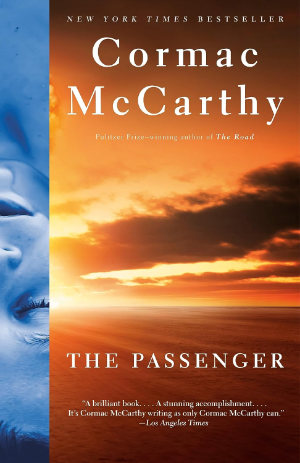The Passenger

A day later Bobby is approached by what appear to be two federal agents. What did he find? Did he remove anything? They also comment that a passenger is missing. Ah ha! Here's the title of the novel. We anticipate that the remainder of the book will lead us to some kind of identity—but it's kind of what Hitchcock calls a MacGuffin.
As we read along, a chapter moves to a woman crossing a snowy field somewhere and it appears she eventually has taken her own life as she drops to the ground.
We begin moving from regular typeface sections to italicized sections, which appear to be when the woman is hallucinating other beings. They are carrying on conversations with her. The primary hallucination is the Thalidomide Kid, a blue dwarf with a round, bald head. It's all very odd. Discussions are far ranging and touch on numerous details, but we glean that she is of genius level intelligence in maths and is trying to figure out her place in the universe.
Back in Western's world things begin getting odd, as well. His friend takes a dive job in Venezuela and Bobby learns later that he died doing it. The feds keep showing up, trashing his small apartment, scaring his cat, forcing him to relocate to a bare room in a nearby bar he frequents.
Always returning to the woman, we eventually learn she is Alicia Western, Bobby's sister. I kept fact checking her on Wikipedia as I read and it all seemed to check out as far as I could tell. Maths were not my forte. I stopped checking at some point. McCarthy was a visiting scholar at the Santa Fe Institute (SFI) for many years and had befriended notable scientists and mathematicians. He's not going to let something get by him—even in something that will sit on fiction shelves in libraries.
More paranoia for Bobby Western ensues when he learns his bank accounts have been frozen. He begins an existence not unlike that seen in his novel The Road (only he's solo). He meets up with a connected lawyer eventually who can help set him up with a new identity. So I begin wondering, is Bobby the passenger? Starts novel with one name, ends with another. Perhaps that could be one way to look at it. However, does he end up making the switch? Not revealing that here.
Philosophical ideas abound along with literary references. I totally loved reading this book and it was over within 48 hours.
There is even a more plausable explanation laid out by the lawyer than any I've yet heard on JFK's assassination. That's more of McCarthy doing in-depth research on ballistics, the physics of bullet types and trajectories, combined with comparisons to The Warren Report.
McCarthy is more than a little interested in Wittgenstein and the philosophy of language, our pre-linguistic inheritances. In short, the Broca region of the brain, though he doesn't specifically reference it once.
We also later learn Bobby and Alicia's father was involved in the Manhattan Project, an explosive revelation and a timely one now that the movie Oppenheimer has won several Academy Awards. For me, there's more to learn about Oppenheimer in this book than in the movie. Kind of. I think both McCarthy and Nolan had access to similar background sources. But McCarthy knows more of the science and who did what in terms of contributions. And how guilty some of the scientists on that project felt, but not by Western's father.
The book concludes with an unopened envelope, which I'm assuming is part of the "second volume" of this series, Stella Maris.
So now I'm beginning to read Stella Maris, McCarthy's follow-up to The Passenger. Stella Maris is a rehab clinic, which Alicia shows up to with a bag carrying $40,000 and a toothbrush. She initially attempts to check into the clinic where Rose Kennedy lived her entire life hidden from public view by a family that cruelly lobotomized her, but was unable to gain admitance. Thus far it's a series of interviews with her psychologist. They are clearly more than on equal footing regarding intelligence and we get some back story on some things. Like why she may have taken her own life in the first part of The Passenger.
Here's the separate entry for Stella Maris. I was less taken by it as a literary work than as McCarthy diving down some technical rabbit holes with his Alice.